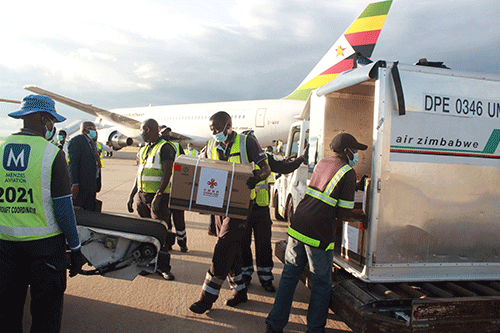Health minister Dr Kalumbi Shangula says the Covid-19 vaccination is a voluntary exercise and no one will be forced to get vaccinated.
Namibia’s Covid-19 vaccination roll-out phase one is expected to take place from 19 March to 16 April concurrently in the Khomas and Erongo regions.
The two regions have, at different times, been classified as epicentres of the Covid-19 pandemic in Namibia.
Tuesday was a historic day for Namibia after it received its first batch of Covid-19 Sinopharm vaccine doses donated by the Chinese government.
The 100 000 vaccine doses arrived on an Air Zimbabwe aircraft at the Hosea Kutako International Airport.
Many Namibians are not yet clear if it is a mandatory or voluntary exercise.
The same concern was raised by Popular Democratic Movement (PDM) Member of Parliament Elma Dienda, who asked Shangula in the National Assembly yesterday to provide clarity around the issue of vaccination.
Shangula made it clear that the process is not mandatory but will be taken by those who wish to be administered.
“Vaccination is voluntary. When it comes to those who want to be vaccinated, they are welcome. They will be scrutinised to see if they meet the criteria in terms of age categories and if they have any comorbidities.
No one will force you; it’s not a mandatory exercise,” Shangula explained.
The campaign will involve the vaccination of individuals from eligible demographics, identified under phase one of the national deployment plan.
Vaccination will take place at fixed health facilities and will be administered by trained nurses.
The target populations include frontline health care workers, community health workers, persons who are between 18 to 59 years, persons in close settings – and those operating cross-border transportations.
These comprise truck drivers, pilots, cross-border public transport bus drivers, employees at points of entry, police officers, journalists, members of the diplomatic corps, mining and fishery sector employees, as well as religious and traditional leaders. People with disabilities, minorities and refugees will also be prioritised in phase one. Persons with comorbidities, those older than 60 years, as well as pregnant and lactating women will be excluded to allow the country to obtain more data on the use of the Sinopharm vaccine.
Vaccination will be conducted at various private and public hospitals.
These include the Windhoek Central Hospital, Katutura Intermediate Hospital, Windhoek Rhino Park Hospital, Lady Pohamba Private Hospital, Swakopmund state hospital, MediClinic Swakopmund, Walvis Bay state hospital and the Walvis Bay Welwitschia Private Hospital.
The Sinopharm vaccine is a two-dose vaccine of 0.5ml and is administered on day 0 and day 28.
Shangula said individuals confirmed as positive with Covid-19 must wait for 90 days before receiving their first dose.
Clients will be observed for 15 minutes and 30 minutes after vaccination.
They are encouraged to report telephonically or visit the nearest health facility if they experience any potential side effects or adverse event following immunisation.
“Now that the Covid-19 vaccine has arrived in Namibia, we will hit the ground running. Our work will start immediately, guided by a well-articulated plan of action. Vaccination in Namibia will be conducted in phases. It will be rolled out under the auspices of our existing expanded programme on immunisation, latching on to the existing infrastructure, human resources and experience,” he indicated.
Namibia aims to vaccinate between 60% and 80% of the population to achieve the required level of herd immunity.
However, the allocation of vaccines for Namibia from the COVAX Facility will only cover 20% of the Namibian population, compelling the country to source the remaining 60% of its vaccine requirements from other sources.
With the rollout of the vaccines, Shangula believes the impact of the pandemic on societies is going to recede.
He expressed gratitude to the Chinese government for their selfless generosity in donating the Covid-19 vaccine to Namibia, adding this is a demonstration of true solidarity and friendship between the two countries.
Equally, he thanked the Zimbabwean government for literally going out of its way to help deliver Namibia’s first consignment of the Covid-19 vaccine from China.
- anakale@nepc.com.na


